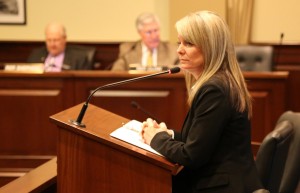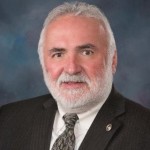State superintendent Sherri Ybarra drew glowing reviews from the House Education Committee Monday after briefing lawmakers on her efforts to seek flexibility from federal education laws.

Ybarra spoke for nearly an hour about her meetings last week with the Council of Chief State School Officers in Washington, D.C., where she met President Obama and discussed education policy with other schools chiefs and Education Secretary Arne Duncan.
Ybarra and her staff are writing a new waiver application to grant the state flexibility out from under the No Child Left Behind / Elementary and Secondary Education Act.
Throughout her briefing, Ybarra returned to her campaign promises to back away from a system that she said is too focused on compliance and punishment and move towards a system of support, encouragement and achievement.
“This is a real opportunity for us to make some substantial changes,” Ybarra told lawmakers. “It’s a true chance for us to change our culture and decentralize education.”
Ybarra again stressed that Idaho schools are obligated to give the Idaho Standards Achievement Test by Smarter Balanced this year. The state has already received federal funding and agreed through its existing waiver to give the test.
Not giving the test would be akin to breaking the law, Ybarra said.
“To say now, ‘I don’t think our district is going to take test,’ that’s unacceptable,” Ybarra told lawmakers.
Last week, Madison Superintendent Geoffrey Thomas confirmed that his district’s approximately 5,200 students will not take the test this year.
“Our intent is to have conversations with that district moving forward,” Ybarra told Idaho Education News. “At this time I’m not concerned. It’s more about educating folks about the federal law and the consequences for that. We are bound to the testing requirement this year.”
Ybarra’s special assistant Tim Corder told lawmakers last week the state could face a federal penalty of $11.6 million if 95 percent of its students don’t complete the test.
In the upcoming waiver, Ybarra and her staff are removing a provision designed to allow schools or parents to opt children out of the test.
Ybarra plans to replace the state’s five-star rating system with a three-tiered system, where schools are either classified as below standards, meeting standards or exemplary.
She also pledged to flip the calculations for accountability. Instead of subtracting stars or points from schools or districts that do not meet standards or requirements, she wants to award points for schools or districts that meet standards and goals.
Ybarra stressed that she would not eliminate accountability, but instead wants to rebuild the system based around positivity.
After her trip, Ybarra said she is optimistic about some options for early childhood education or preschool, and planned to look into potential nonmandatory models or pilot programs.

“It was pretty exciting to have conversations about early childhood education and the possibility that (the feds) would like to add that to the waiver,” Ybarra said. “We often talk about jump-starting kids into college, but we don’t talk about jump-starting kids into kindergarten.”
Boise Democratic Rep. Hy Kloc and a small number of other lawmakers have been pushing pre-K proposals the last two years, but efforts stalled as Republicans argue they need to first fix the K-12 system and that the best education young children can receive is in the home.
Idaho is one of 10 states that does not offer public preschool.
House Education Committee Chairman Reed DeMordaunt, R-Eagle, called Ybarra’s briefing “fantastic” and “awesome.”
Rep Ryan Kerby, R-New Plymouth, described her presentation as “very interesting.” After her 25-minute speech and 35-minute question-and-answer session, numerous lawmakers surrounded her in the hallway after the meeting to thank her.
The education committee is expected to meet one more time before the session ends – but only just to approve meeting minutes and wrap up the year’s business.
